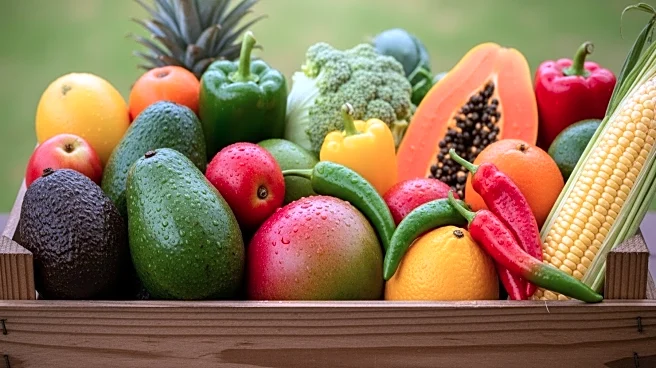What's Happening?
Mexico's agricultural sector, a significant contributor to the country's economy, is facing multiple challenges including water scarcity, climate change, and market pressures. Despite contributing 3.8% to the GDP, the sector is crucial for trade, with agri-food exports reaching $19.4 billion from January to October 2024. The sector covers 49 million acres, with 47 million acres harvested in 2024, generating a production value of 855.8 billion pesos. However, northern states like Sonora and Chihuahua are experiencing dwindling reservoir levels, threatening irrigation-dependent crops. Climate change is causing increased drought frequency and unpredictable rainfall, disrupting planting cycles and reducing yields. Smallholder farmers, who make up over 70% of the sector, face limited access to credit and modern technologies, making them vulnerable to market volatility and extreme weather. Peso appreciation has reduced dollar-denominated returns on exports, while global competition intensifies in key crops like tomatoes and berries.
Why It's Important?
The challenges faced by Mexico's agricultural sector have significant implications for food security and economic stability. Water scarcity and climate change threaten the sustainability of crop production, which is vital for both domestic consumption and international trade. Smallholder farmers, who are crucial to the sector, are at risk due to limited resources and exposure to market fluctuations. The sector's ability to adapt to these challenges will determine its future contribution to the economy and its role in global agricultural markets. Innovations in water-efficient farming, genetic research, and cooperative models are essential to enhance resilience and ensure sustainable growth. The sector's performance impacts not only Mexico's economy but also its trade relationships, particularly under agreements like the USMCA.
What's Next?
Mexico is addressing these challenges through technological advancements and new business models. Water-efficient farming techniques, such as drip irrigation and precision agriculture, are being adopted to improve yields while conserving water. Genetic research is focused on developing drought-resistant maize varieties to stabilize production. Smallholder cooperatives are helping farmers secure better prices, especially for coffee and beans. Urban agriculture projects are connecting consumers directly with growers, reducing food miles and supporting local economies. Sustainable certification for organic farming and fair-trade practices are expanding, particularly in export-oriented crops. These initiatives aim to strengthen the sector's resilience and ensure its continued prominence in global agriculture.
Beyond the Headlines
The shift towards sustainable practices in Mexico's agricultural sector highlights broader ethical and environmental considerations. The adoption of water-efficient farming and genetic research not only addresses immediate challenges but also contributes to long-term ecological balance. The expansion of cooperatives and fair-trade practices reflects a growing emphasis on social equity and economic justice for smallholder farmers. Urban agriculture projects and sustainable certifications indicate a cultural shift towards local and environmentally conscious consumption. These developments underscore the importance of integrating traditional agricultural methods with modern innovations to achieve sustainable growth.









